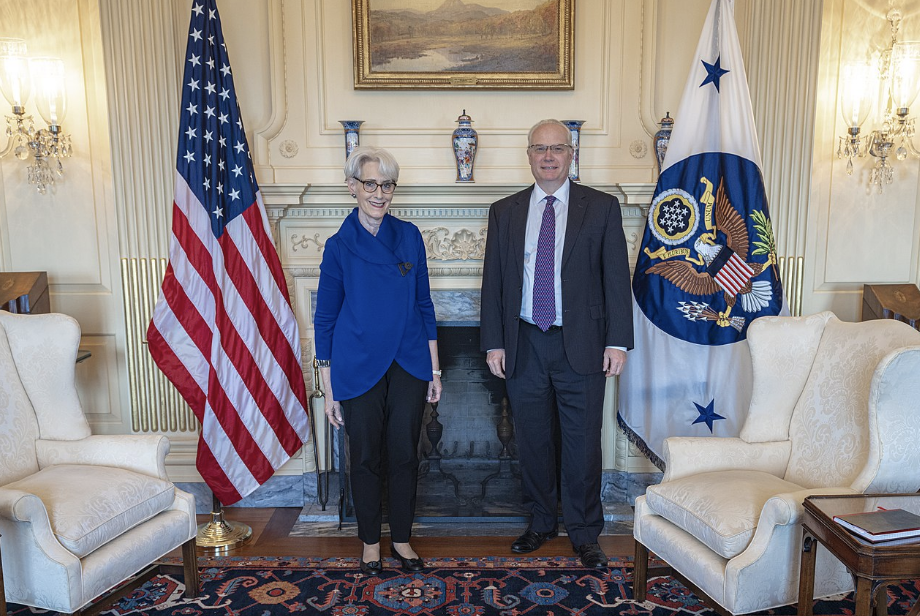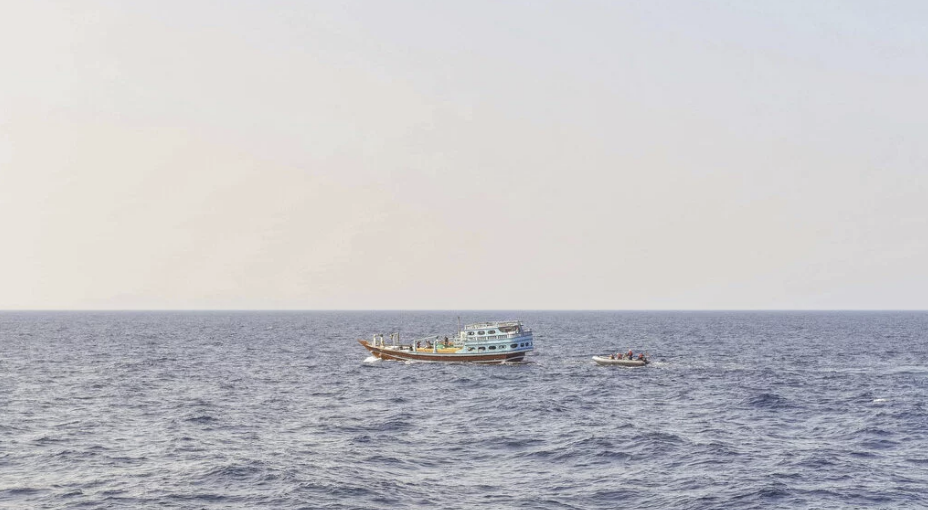US Special Envoy for Yemen Returns from UAE, Saudi Arabia as War Fades From Headlines
US Special Envoy for Yemen Timothy Lenderking, former Deputy Assistant Secretary of State for Iran, Iraq, and Regional Multilateral Affairs in the Near East Bureau, with Deputy Secretary of State Wendy Sherman in 2021. Photo: US Department of State.
Tim Lenderking, US Special Envoy for Yemen, returned Wednesday from a week-long trip to the United Arab Emirates and Saudi Arabia “where he met with Emirati, Saudi, Yemeni officials and… representatives from P5 [China, France, Russia, the UK, and the US]”, among others, according to a press release from the U.S. Department of State. The press release seemed to indicate that limited progress has been made on reaching a long-term peace agreement, even as the civil war enters its eighth year.
A six-month-long UN-brokered ceasefire between the Yemeni government and Houthi rebels expired on Oct. 2 after two extensions, and has not yet been renewed. When the truce took effect in April, the port of Hodeidah began to reopen to legitimate imports for the first time in years (a 2018 peace deal to the same effect had fallen through). The prices of essential goods stabilized and gasoline was once again regularly available in Sana’a. The UN estimated that civilian deaths declined by 60 percent during those six months and new displacement fell by half.
Two weeks after the ceasefire expired, Saudi Arabia’s Foreign Minister Prince Faisal bin Farhan insisted to Al Arabiya that “The Kingdom, the [Arab] Coalition and the Yemeni government are all keen on extending the truce,” but that “the Houthis keep proposing new conditions.” Representatives of the Houthi movement did not respond to early requests for comment by Al-Jazeera but said that talks were a “dead-end” until the Sana’a airport could be reopened and the Saudi blockade of the port of Hodeidah completely removed. The UN verified three incidents of shelling and three cases of snipers targeting civilians, all in suspected Houthi attacks, in the four weeks after the truce expired.
A series of political conflicts escalated around 2015, in the aftermath of the Arab Spring and other regional civil wars, with a mostly Shia rebel group from the northern half of Yemen (which was once two countries) driving the Yemeni government from the capital, Sana’a. The Houthi rebels, who either had or have since developed support from Iran, were then targeted by air attacks from an "Arab Coalition" in support of the government of nominal (but later exiled) President Hadi.
Saudi Arabia and the United Arab Emirates formed the basis of support for the Yemeni government (under President Saleh and later President Hadi), although the two neighbors were not always in lockstep with each other. The United States, United Kingdom, and others provided intelligence and air support to the Arab Coalition until human rights concerns and the killings of civilians led them to scale down operations in the last four years. The last reported US drone strike in Yemen was in Jan. 2020. Substantial contingents of ISIS and AQAP (Al-Qaeda) also captured territory at various points of the civil war and launched attacks on Yemeni civilians.
The United States designated the Houthis a terrorist organization in the last ten days of the Trump administration, a decision that further complicated humanitarian aid to a population suffering from mass food insecurity and periodic cholera epidemics by preventing the United States from negotiating with the Houthis. The Biden administration reversed this designation a month later, allowing US mediators to return to the UN-brokered truce process. In March 2021, the Biden administration released a document outlining its primary foreign policy goals at the time, an “Interim National Security Strategic Guidance.” As I wrote at the time in this paper, the report encouraged a U.S. withdrawal from "supporting offensive military operations in Yemen and backed UN efforts to end the war." A deal finally took effect on April 2, 2022. As part of the truce, President Hadi, living in Saudi Arabia, formally gave up his power to a transitional committee.
A dhow headed to Yemen from Iran is intercepted by US Navy sailors on Nov. 8; a search of the vessel found missile fuel hidden in a secret compartment. Photo: U.S. Navy via AP/ Kevin Frus.
Conditions in the already-impoverished country (where basic infrastructure and opportunities for investment or economic development were already devastated by decades of civil war and insurgency during the Cold War) deteriorated in the last eight years, and have fallen again since the ceasefire expired. The UN called the situation in Yemen by 2020 “the world’s worst humanitarian crisis,” and at least 150,000 people have died from the civil war, starvation, and preventable disease. Many farmers have turned to growing the popular narcotic qat to eke out a living, water-hungry crop that has worsened the effects of drought and climate change in an already mostly desertified region. A lack of basic medical and food supplies across the country has led to a haphazard black market, with deadly consequences.
On Tuesday, a US naval ship announced it had intercepted some 70 tons of missile fuel headed from Iran to Yemen, possibly indicating that the Houthis plan to resume their periodic missile attacks on Saudi Arabia or the UAE, which occasionally hit infrastructure targets, airports, and drilling operations.
Special Envoy Lenderking’s challenges to salvage the peace deal come as the war continues to make daily life in large sections of the country nearly impossible but as it has faded from the headlines, especially in the United States. The New York Times hasn't published on Yemen, besides a few exceptionally tangential references in articles about Saudi Arabia, since Sept. 7. The Washington Post hasn’t written about Yemen since July, and even CNN hasn't referenced the situation in Yemen beyond oblique references to the food crisis in the context of the war in Ukraine or allusions to Saudi-Iran competition since a mid-October reissue of an older article.


